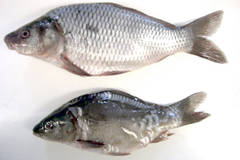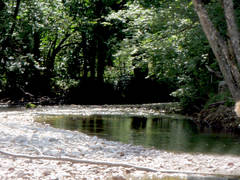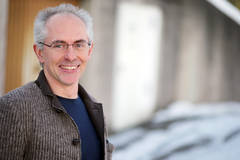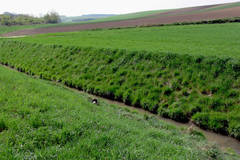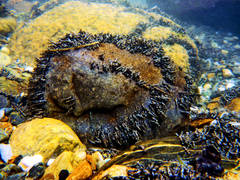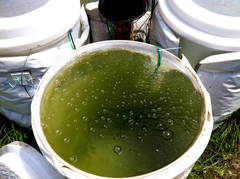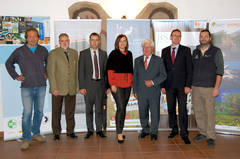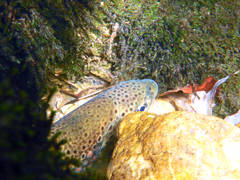Sebastian Schultz successfully defended his PhD last week (Feb 17, 2017) at the University of Vienna. In his research he tested how fish feeds of different dietary composition affected biomass accrual, lipid and fatty acid composition, and methyl mercury bioaccumulation in Common Carp in aquaculture ponds of Lower Austria. Sebastian's research was conducted in the research group LIPTOX and supported by the Austrian Science Fund project L516-B17. Congratulations!
EcoCatch - Stream Ecology and Catchment Biogeochemistry - is the new group name of the former working group BERG. Since Jakob Schelker took over the lead of the group from Tom Battin two years ago, the focus has shifted towards investigating the importance of soil-stream connectivity and in-stream processing for landscape biogeochemistry. Main research topics of EcoCatch are biogeochemistry, stream ecology, microbial ecology and biodiversity of streams, cycling of carbon, nutrients and metals.
Since January 1st 2017 WasserCluster Manager Thomas Hein is new university professor for Hydrobiology and Aquatic Ecosystem Management (successor of Prof. Jungwirt) at the University of Natural Resources and Life Sciences, Vienna. Congratulations from the WasserCluster team
Agriculture is the dominant land use form in Lower Austria, covering more than 46 % of the total area. Agriculture delivers significant amounts of dissolved organic matter (DOM) to streams, thereby changing basic processes at the water-sediment interface and affecting the ecological state of the stream ecosystem. In January 2017 WasserCluster Lunz started the project “organic carbon cycling in streams” with project leader Gabriele Weigelhofer. The aim of the project is, thus, to investigate the influence of agricultural land use on the quantity and quality of DOM inputs to streams and to clarify the effects of this DOM on the aquatic carbon cycling in stream ecosystems.
Veronika Kasper wrote her master thesis under supervision of Thomas Hein about Microphytobenthos (MPB), small algae attached to a substrate. It plays a major role in lotic ecosystems and is often affected by multiple stressors. Thermopeaking (TP) combines stress of sudden flow velocity increase (Hydropeaking) and abrupt water temperature alteration. Although this effect is prevalent in alpine regions, studies concerning its influence on MPB are a critical knowledge gap. Therefore the aim of this project was to provide knowledge about the impact of TP on MPB, considering as well successional and habitat aspects.
The effect of temperature change on aquatic food webs is gaining increasing scientific attention. The recent IPCC report anticipated a rise in lake water temperature of up to 4°C, accompanied by a series of weather events that may cause frequent temperature fluctuations. In this study, masterstudent Paula Take investigated under supervision of Martin Kainz how increasing temperature affects the biodiversity and biochemical composition of plankton communities by conducting long-term, multi-seasonal mesocosm experiments.
On Tuesday, November 8th, took place the kick-off meeting for the project InterBird in the directorate of national park Sarród Kócsagvár. Working group leader Robert Ptacnik and WCL-researcher Zsófia Horváth talked about their activities in the course of this interregional project. In the focus of their work is the food web of soda pans from primary produciton to birds. The basic aim of the project is the cross-border coordination of activities and research of nature protection for the perpetuation of biodiverstiy.
In September started the new FWF-project „GROW“, a cooperation between working group leader Martin Kainz and Ariana Chiapella (USA), who will work at WasserCluster for one year. In this project we will investigate dietary trajectories from various food sources to fish in established mesocosm settings.
The delineation of trophic pathways in aquatic food webs is necessary for evaluating the structure and flow of energy among organisms. Understanding the importance of each energy pathway is also necessary for studying food webs in the context of anthropogenic stressors.




